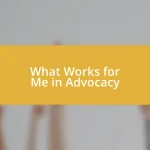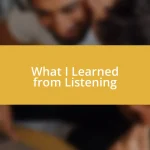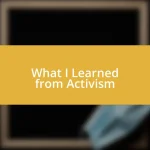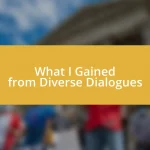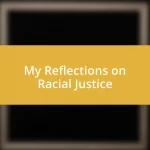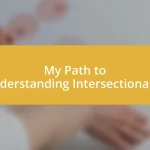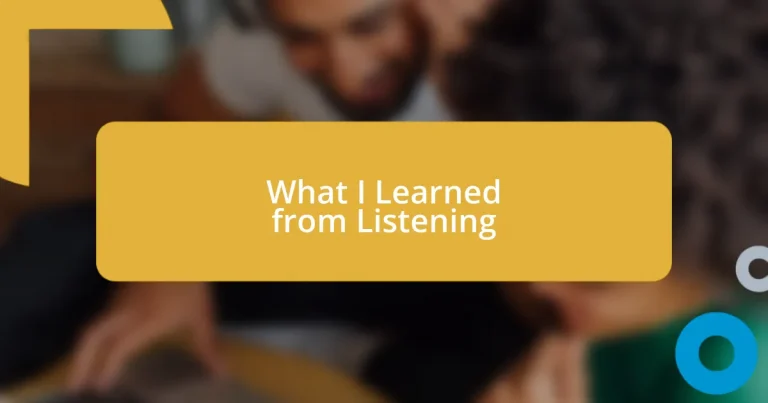Key takeaways:
- Effective listening fosters trust and understanding, transforming relationships both personally and professionally.
- Key techniques for better listening include reflective listening, minimizing distractions, and asking open-ended questions to encourage depth in conversations.
- Learning from diverse perspectives enhances empathy and challenges assumptions, enriching interpersonal connections.
- Transforming listening lessons into actionable steps, like practicing active listening and incorporating feedback, significantly boosts personal growth and engagement in conversations.
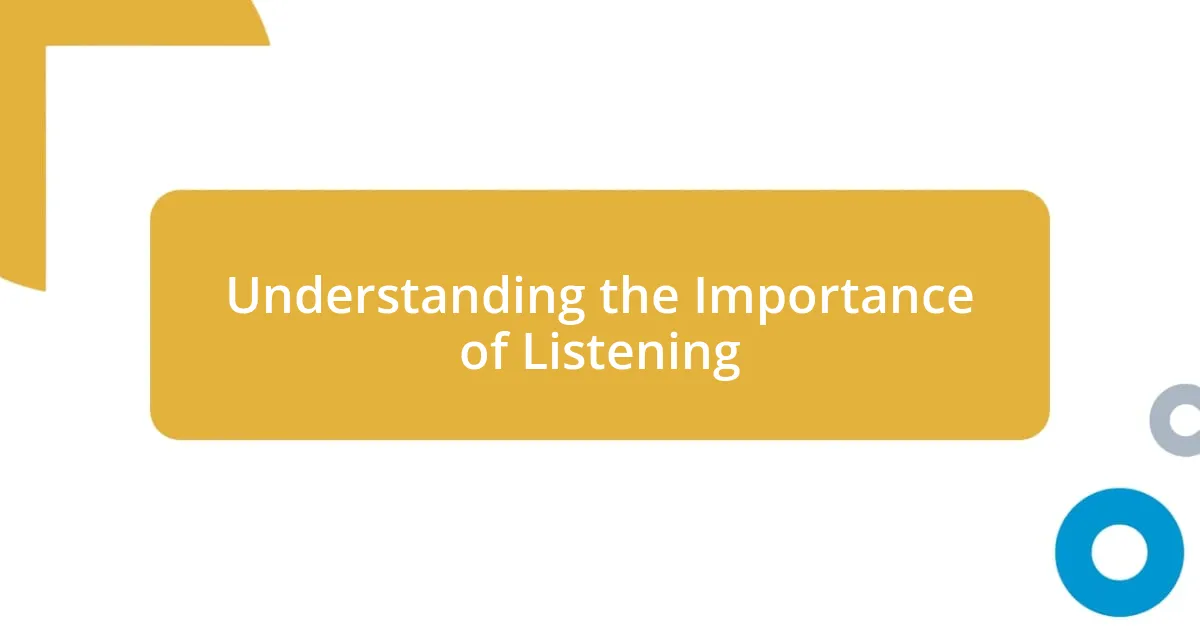
Understanding the Importance of Listening
Listening goes beyond merely hearing words; it’s about connection. I remember a time when a friend of mine opened up about a tough situation. I simply listened, and in that moment, I realized that my presence and attention were more powerful than any advice I could offer. How often do we focus on responding rather than truly absorbing someone else’s experience?
In my own journey, I’ve found that effective listening fosters trust and understanding. When colleagues share their ideas, I make it a point to listen deeply. This creates an environment where everyone feels valued. I often ask myself, “What if I missed a valuable insight just because I was too quick to speak?” This mindset has transformed not only my relationships but also my professional collaborations.
Being an attentive listener can shift the dynamics of any conversation. I’ve seen it happen during workshops; participants who felt unheard blossomed when they knew their contributions were genuinely welcomed. I often think about how profound the ripple effect of active listening can be. How does it feel for you to share your thoughts when you know someone is truly listening? It’s uplifting, isn’t it?
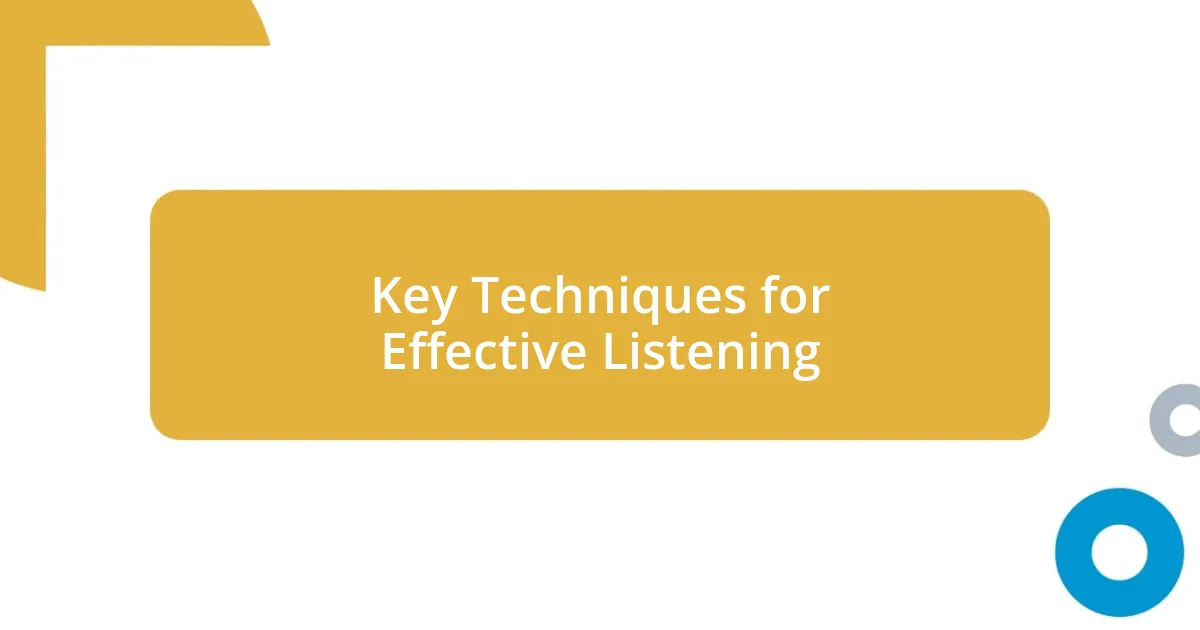
Key Techniques for Effective Listening
Effective listening requires more than simply keeping quiet while others speak; it demands active engagement. One technique I’ve found invaluable is to practice reflective listening. This means summarizing what the speaker has said to confirm understanding. I remember a conversation with a mentor where I repeated back her points, and her relief was palpable. She felt understood, and our connection deepened significantly. Isn’t it amazing how a few words to echo someone’s thoughts can create such a bond?
Another important technique is to remain present and eliminate distractions. In our fast-paced lives, it’s easy to get sidetracked by notifications or our own thoughts. I consciously put my phone away during discussions; this simple action has transformed my interactions. I recall a meeting where I locked eyes with my colleague, making it clear that her input was truly valued. The result? A more vibrant exchange of ideas and a stronger team connection. Have you experienced the difference when someone gives you their full attention?
Finally, asking open-ended questions is a powerful way to encourage depth in conversation. It allows the speaker to explore their feelings or ideas more thoroughly. In a recent discussion, instead of asking, “Did you like the project?”, I asked, “What were your thoughts on the project’s impact?” The shift in tone was immediate; the speaker lightened up and shared insights I hadn’t expected. Isn’t it fascinating how the right question can unlock a whole new dimension of conversation?
| Technique | Description |
|---|---|
| Reflective Listening | Summarizing what the speaker says to confirm understanding, enhancing connection. |
| Minimize Distractions | Eliminate external interruptions to provide undivided attention during conversations. |
| Open-Ended Questions | Encouraging detailed responses by asking questions that require more than a yes or no answer. |
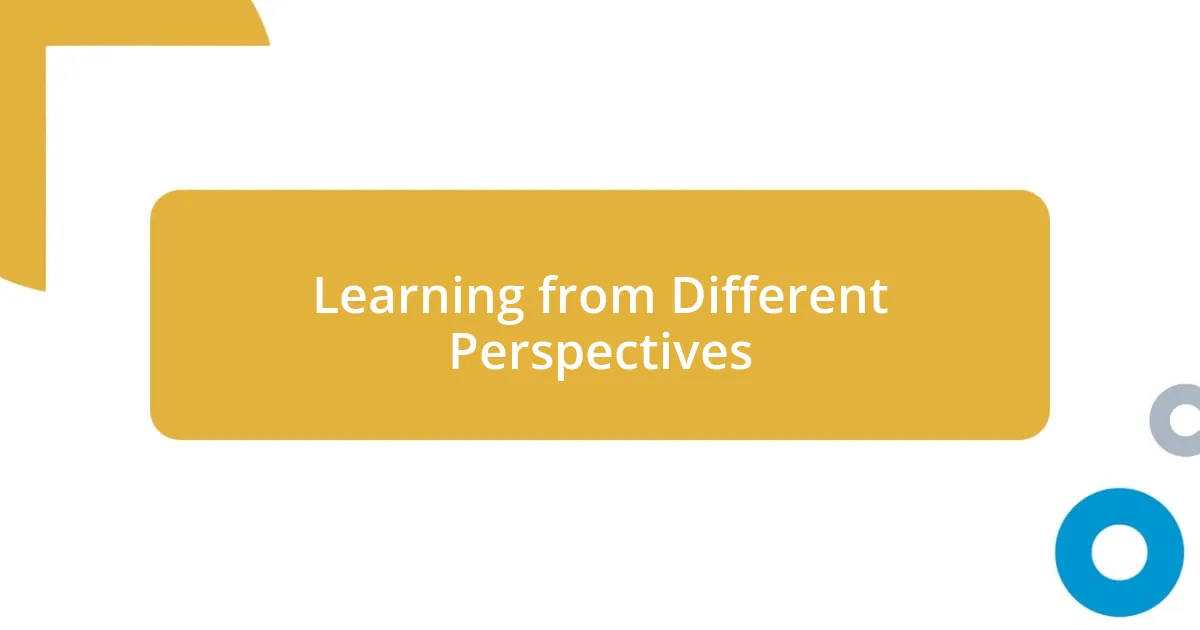
Learning from Different Perspectives
When I think about learning from different perspectives, I find it fascinating how diverse experiences enhance our understanding. Just recently, during a community event, I was seated beside someone from a completely different culture. Our conversation flowed into her childhood traditions and the values instilled in her. I could almost feel the weight of her memories as she shared stories of celebration and resilience, and it shifted my own viewpoint. I realized how easily we can learn and grow simply by being open to someone else’s story.
Here are some key insights from my experiences in these interactions:
- Embrace Vulnerability: Sharing personal stories encourages others to open up, creating a circle of trust.
- Challenge Assumptions: Engaging with different backgrounds often confronts my preconceived notions and encourages deeper self-reflection.
- Foster Empathy: Understanding another person’s journey cultivates compassion, enriching our relationships both personally and professionally.
I remember a workshop where participants were encouraged to partner with someone they didn’t know. I partnered with a quiet woman. While at first, I was unsure about the conversation, as we shared our life experiences, my heart opened up to her struggles, and I learned how powerful it is to see the world through someone else’s eyes. It’s like each perspective offers a new lens to view our collective human experience.
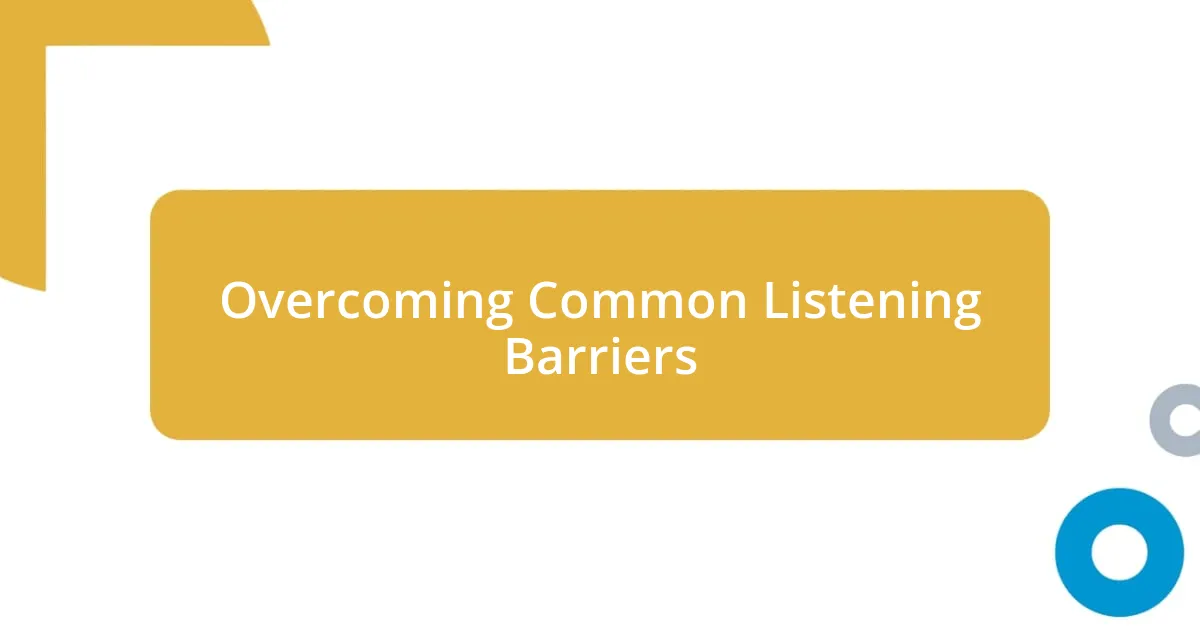
Overcoming Common Listening Barriers
Engaging in conversations can sometimes feel like running a gauntlet of barriers. One significant hurdle is our tendency to formulate responses while the other person is still speaking. I remember being caught in this trap during a family gathering, where I was so eager to interject that I missed several key points my cousin made. This experience taught me the importance of practicing patience. What if we paused, took a deep breath, and truly absorbed what was being said? Doing so not only enhances our understanding but also signals to the speaker that their words matter.
Another common barrier is emotional overload. We all have those moments when stress or personal problems cloud our ability to listen. I faced this during a particularly hectic week at work. A colleague tried to share some exciting ideas, but my mind was racing with my own challenges. I decided to step away for a moment and clear my head. When I returned, I was amazed at how much clarity I had gained, and I could genuinely engage with my colleague’s vision. Isn’t it interesting how changing our mental state can dramatically shift our listening abilities?
Moreover, biases can be insidious barriers to effective listening. During a recent debate with friends, I found myself dismissing an opinion just because it didn’t align with my views. It wasn’t until one of them challenged me, asking if I ever considered the other viewpoint, that I realized my closed-mindedness. I made a conscious effort to listen—really listen—and found that my friend’s perspective enriched my understanding of the topic. How often do we let our biases dictate our conversations, missing out on valuable insights in the process? Opening ourselves to diverse opinions can illuminate paths we never knew existed.
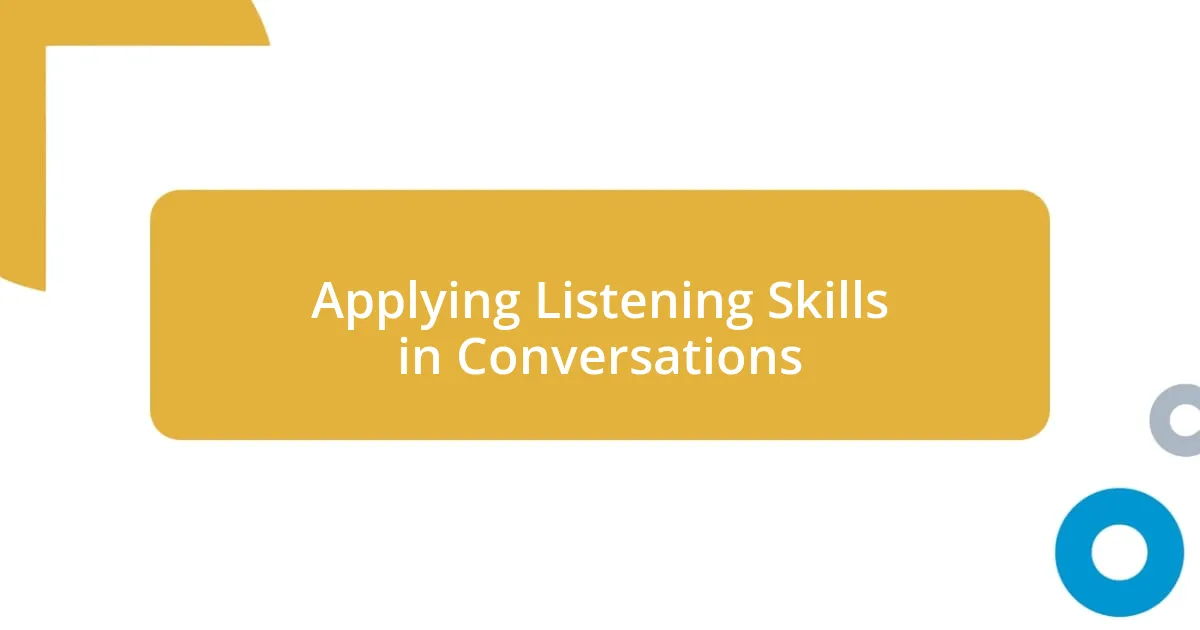
Applying Listening Skills in Conversations
Applying effective listening skills in conversations can transform the way we connect with others. I recall a moment during a team brainstorming session when I actively focused on listening instead of thinking about my next point. By fully immersing myself in my colleagues’ ideas, I found that my contributions flowed more naturally and resonated better with the group. How often do we miss that synergy simply because we’re too preoccupied with our own thoughts?
It’s interesting how the act of paying genuine attention can reveal layers of meaning we might overlook. During a heart-to-heart talk with a friend going through a tough time, I made it a point to really listen, putting aside my own distractions. His vulnerability unfolded beautifully, painting a vivid picture of his struggles. By creating that space for openness, I learned not just about his challenges, but also about the importance of fostering trust in our conversations. What could happen if we all gave each dialogue the same openness?
In my experience, every conversation is an opportunity to deepen relationships. I was once part of a book club discussion where one member shared her interpretation of a character that shocked everyone. Rather than immediately disagreeing, I sought to understand her viewpoint. By engaging with her perspective, I not only learned something new but also discovered a valuable lesson in humility and patience. How much richer would our interactions be if we approached each conversation with curiosity instead of judgment?
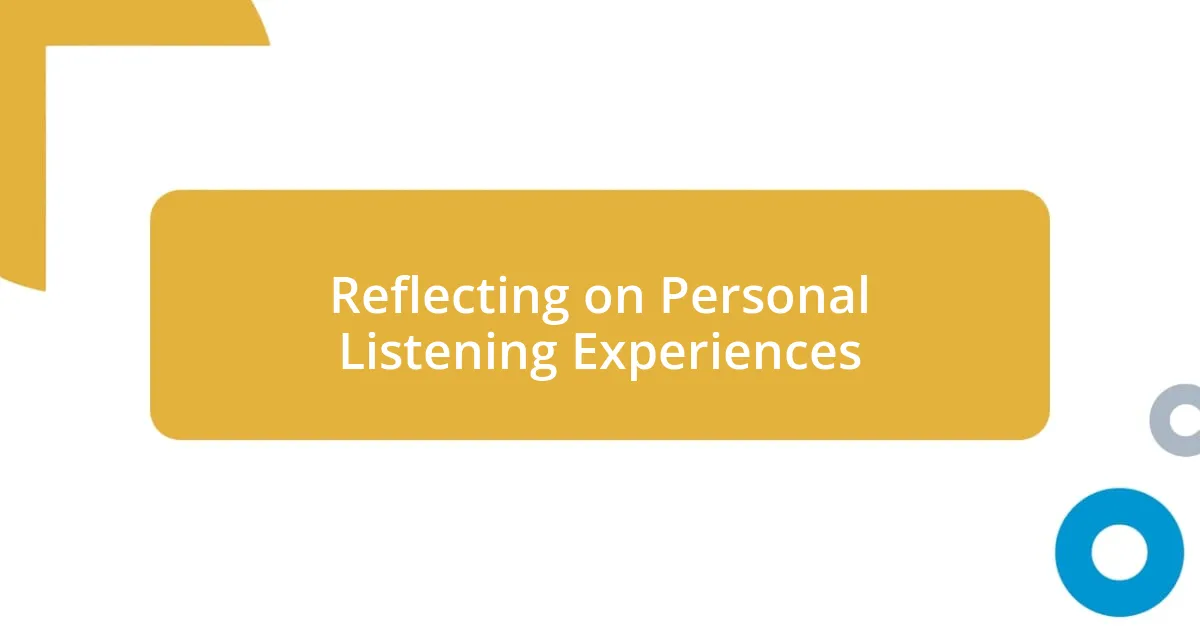
Reflecting on Personal Listening Experiences
Reflecting on my listening experiences, I can’t help but recall a time in a group project where my eagerness to lead overshadowed the importance of hearing my teammates. During a brainstorming session, I dominated the conversation, assuming I had the best ideas. Yet, when I finally paused and encouraged everyone to share, I was stunned by the innovative suggestions that emerged. Isn’t it fascinating how one simple shift can open a floodgate of creativity?
Another moment that stands out for me was during a casual dinner with friends. One of them began to share a recent struggle, and rather than jumping in with advice, I made a conscious choice to listen. The more I tuned in, the more I understood the depth of her feelings. This experience cemented for me that sometimes, just being present is far more valuable than trying to fix someone’s problems. Have you ever experienced that profound connection simply by allowing someone to be heard?
Looking back, I realize that moments of active listening have shaped my relationships in unexpected ways. Once, during a volunteer meeting, a newcomer expressed her thoughts with so much hesitancy that it tugged at my heart. I decided to give her my undivided attention, validating her input. The sheer relief on her face was a revelation; it not only empowered her but also created a welcoming environment for others. How many people have stories or ideas that we miss out on simply because we’re not truly engaged?
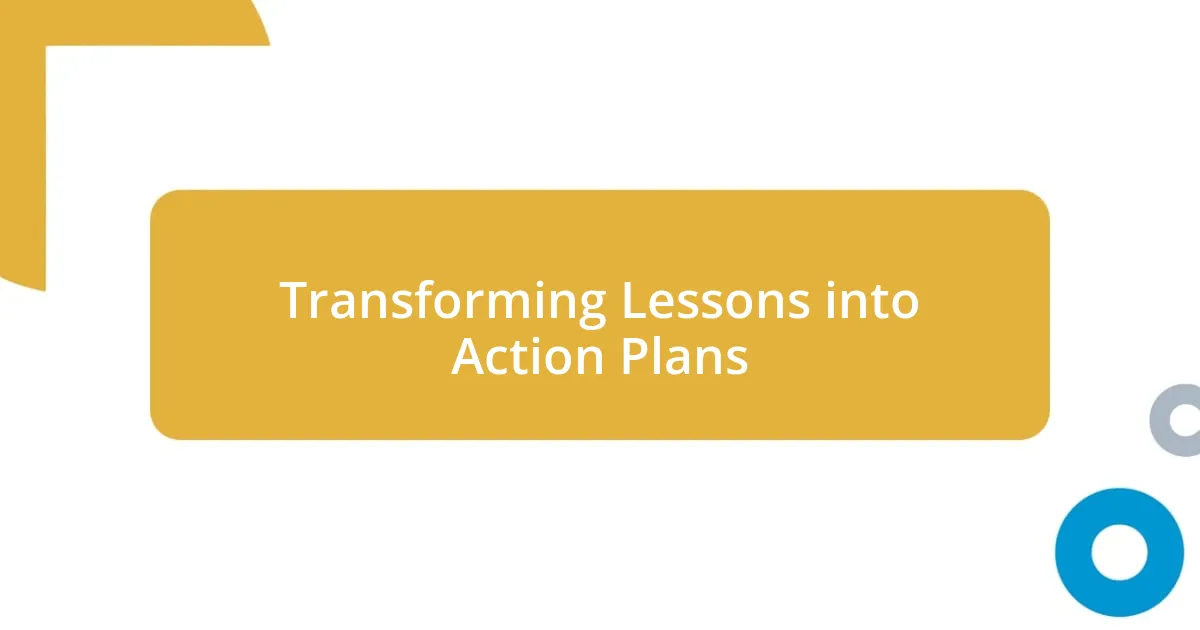
Transforming Lessons into Action Plans
Transforming lessons learned from listening into actionable steps can significantly enhance personal growth. I recall a workshop where the facilitator encouraged us to jot down insights from discussions that resonated with us. By revisiting those notes later, I crafted a concrete action plan focused on improving my listening skills—incorporating things like setting aside dedicated time to practice active listening in everyday conversations. Isn’t it amazing how that simple act of writing can crystallize our thoughts into tangible goals?
One experience that stands out was when I decided to implement feedback from a mentor about my listening approach. She suggested I ask more open-ended questions to foster deeper discussions. I began using this strategy in my team meetings. The shift was palpable; team members began to engage more fully, revealing insights I hadn’t anticipated. Have you ever noticed how a single question can unlock a flood of ideas?
After applying these techniques, I found it essential to periodically review my progress. Recently, I set aside a few minutes after each conversation to reflect on what I learned and how I could improve. This reflection not only enriched my understanding but also solidified my commitment to becoming a better listener. How often do we take the time to truly evaluate our interactions? Transforming lessons into action plans isn’t just about skill development; it’s a journey toward meaningful connections.
